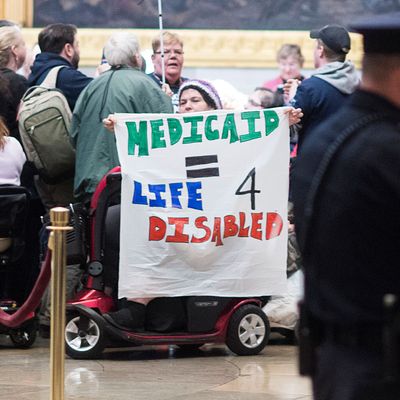
The discussion over the Congressional Budget Office’s “score” of the House-passed American Health Care Act has, naturally, focused on the things in the bill that changed since the last CBO report in March, before the bill was modified to get a bare majority of House votes.
And thus, nearly all the talk since the new report came out has been about CBO’s assessment of the individual insurance market changes that persuaded the House Freedom Caucus to climb onboard the Trumpcare train, along with the last-minute money thrown at high-risk pools for people with preexisting conditions that kept just enough “moderates” onboard to pass the bill.
But what did not significantly change, in the bill or in CBO’s assessment, was that Medicaid cuts (made larger over time by the bill’s per capita “cap” on federal Medicaid payments to states) would eliminate health coverage for 14.4 million Americans. The funding cut for Medicaid over ten years amounts to $834 billion. Thus AHCA’s Medicaid provisions account for a majority of the 23 million people expected to lose health insurance, and the biggest counterweight to the bill’s tax cuts and tax-credit reductions, making its $119 billion in deficit reduction possible. A reduced and “capped” Medicaid remains the Great While Whale in the Trumpcare scheme, and to conservatives anxious to find at least one entitlement to “reform,” perhaps its most important legacy.
The Medicaid provisions of the bill will finally get some serious scrutiny in the Senate, where the speed in shutting down the Affordable Care Act’s Medicaid expansion is of great interest to senators — including 20 Republicans — who represent states that exercised that option. So far, the more significant long-term step of capping federal Medicaid allocations to the states is being accepted by those same “moderates.” But as the Senate health-care debate gets down to brass tacks, conservatives will be watching like hawks to ensure that the cap sticks, and that maximum savings are wrung from Medicaid. Aside from gratifying the right’s long-held desire to end Medicaid as an entitlement, slashing the program is necessary to “pay for” the bill’s big tax cuts, and that is ultimately what’s driving this legislation toward Donald Trump’s desk.
In fighting the Medicaid-friendly “moderates,” Senate conservatives will be standing in for the House conservatives who must ultimately approve any final legislation. We will hear a lot from them about how worthless Medicaid is, and how Obamacare’s outrageous extension of Medicaid benefits to people without kids or disabilities (basically, to the working or want-to-be-working poor who did not qualify before) is a horrid expansion of the welfare state — an argument that will be used to justify a horrid retraction of the welfare state over time.
Democrats in the Senate and the House have no real leverage over this legislation so long as Republicans are able to use the budget-reconciliation procedures that make a filibuster impossible. But if Republican “moderates” ultimate accede on Medicaid, which they very well may so long as their states get sweet transition deals for ending the ACA expansion, then Democrats need to make a lot of noise on behalf of the 14 million people at risk of losing benefits, and the many millions more that will be endangered eventually if the GOP succeeds in its long-term goal of gradually handing the Medicaid population over to the states.






























